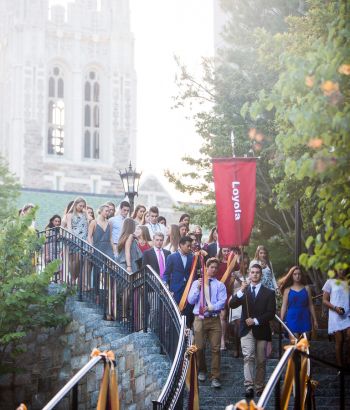
The Invaluable Question: Who Will Our Students Become?
As a nearly 500-year-old tradition of academic excellence around the world, it is interesting to ponder how Jesuit, Catholic liberal arts education will intersect with the future of higher education...In this issue, we explore the historical, contemporary, and future value of Jesuit, Catholic liberal arts education from multiple perspectives.
Read More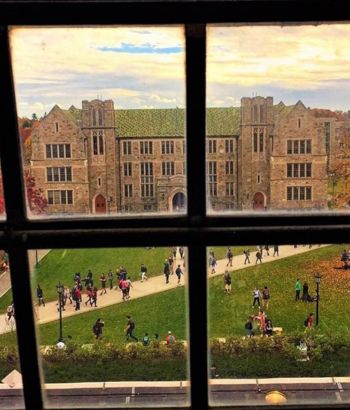
A Vision for a Jesuit, Catholic University
Remarks by Boston College President William P. Leahy, S.J., to BC’s Management Development Perspectives (MDP) program, November 2, 2022 (edited). The MDP program provides BC managers and administrators with access to senior University leadership to promote understanding of institutional goals, challenges, and vision.
Read More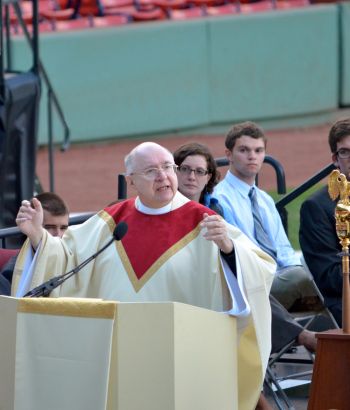
Celebrating Catholic Education
On September 15, 2012, Fr. Michael Himes delivered this homily at a Mass in Fenway Park to nearly 20,000 that celebrated the Sesquicentennial Anniversary of Boston College. The following is an excerpt from his poignant remarks on Jesuit, Catholic higher education.
Read More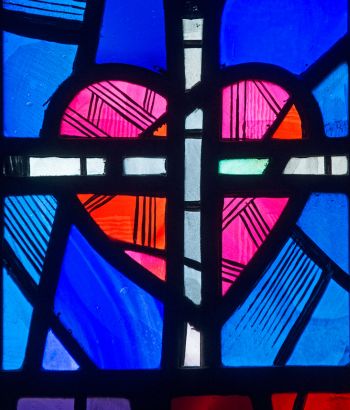
Core Curriculum: The Heart of a Jesuit, Catholic University
The Core is the heart of a Jesuit, Catholic liberal arts education. It is the curriculum that links all students to each other and to the mission. Through these required courses, students explore the disciplines, ask enduring questions, grapple with complex problems develop their talents and skills, and form their characters.
Read More
The Value Proposition of a Liberal Arts Education
As a Boston College (BC) graduate, faculty member, and parent of young adults who have attended Jesuit, Catholic schools—including BC—I...fervently believe the education we provide has never been more valuable.
Read More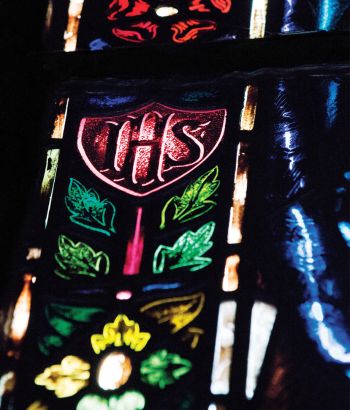
The Catholic Intellectual Tradition and the Jesuit, Catholic University
On January 30, 2024, Dean Gregory Kalscheur, S.J., lectured to students, staff, faculty, and community members on "The Catholic Intellectual Tradition and the Jesuit, Catholic University." The following is an excerpt from the lecture.
Read More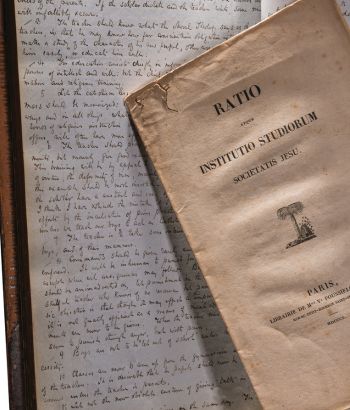
Unveiling Sources: The Jesuit Tradition in Higher Education and How to Cultivate It
Jesuit educational environments have inherited a distinctive characteristic directly derived from the spirituality of St. Ignatius of Loyola and the mindset of the earliest companions who co-founded the Society of Jesus with him.
Read More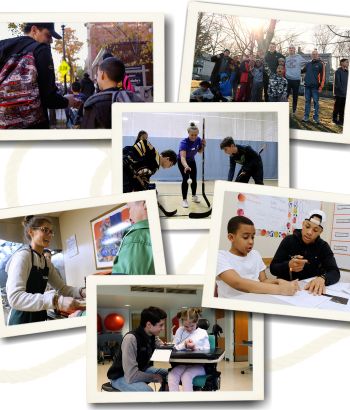
Love in Jesuit Pedagogy
How can teaching help students and future citizens to live in communities that are more just and more loving in seeking out that justice?
Read More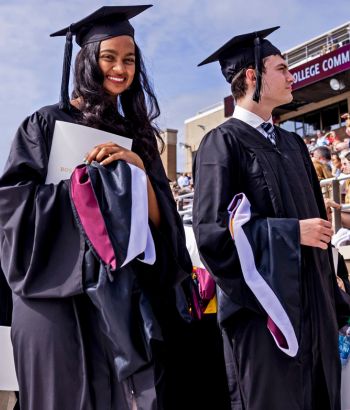
Investing in the Future: Lifelong Skills through the Liberal Arts
When students read the great writers and thinkers, grapple with their ideas, and debate them with peers, they learn how to read critically, think analytically, and communicate effectively with the written and spoken word. These skills imbue students with the versatility to remain competitive in today’s rapidly evolving employment climate.
Read More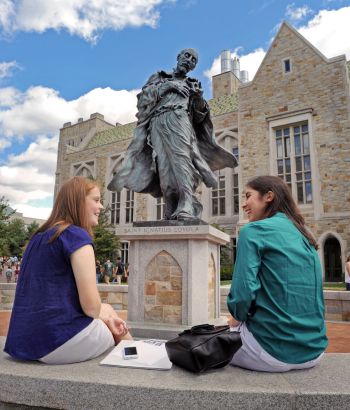
Cultivating Conscience: Why I Chose Catholic Higher Education
Instead of bifurcating students’ experiences and creating silos for their learning, the framework and mission calls us to explore complex problems alongside shared universal truths—ideas that reinforce our shared humanity.
Read More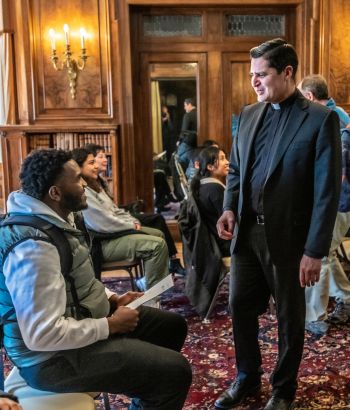
Messina’s Mission: Expanding Access to Transformative Jesuit Education
Messina College brings us full circle to these stories of beginnings, as BC makes another intentional commitment to expand college access.
Read More
Living Catholic Social Teaching: Dorothy Day
Considered polarizing in her lifetime, Dorothy Day is a remarkable and bold role model for future generations. What can she teach us about being committed to our faith and living it authentically? As this article discusses, she not only embraced all aspects of Catholic Social Teaching, but she also developed a devoted spiritual life.
Read More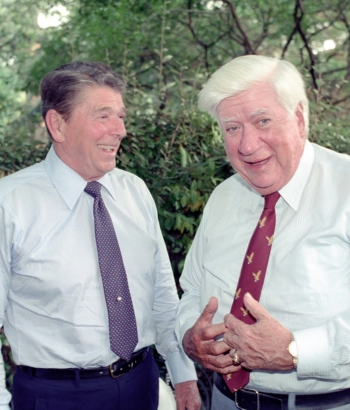
Ronald Reagan and Tip O’Neill: A Real-life Friendship
Despite significant ideological differences, President Ronald Reagan and Speaker of the House Tip O’Neill offer a model of friendship in and through difference. As Rich Gorecki writes, such friendship includes “prayer and support in tough decisions. It relies on each other’s strengths to fill in gaps and speak the truth whenever there’s a shortcoming.”
Read More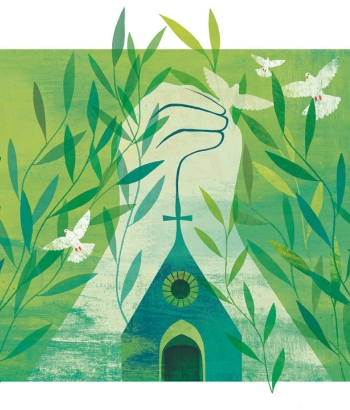
Why Are We at Each Other’s Throats? Healing Our Church
Maureen Day suggests six guidelines to grow in charity rather than polarization: focus on building relationships, be willing to be uncomfortable, start with what we have in common, learn to recognize how shared purposes can have different applications, and engage in dialogue instead of debate.
Read More
Loving Our Neighbor Through Dialogue
The USCCB describes dialogue as an act of love. Reflecting on Pope Francis’ teaching in the encyclical "Fratelli Tutti," the authors understand dialogue as grounded in encounter: as an invitation to relationship that shows love for God, our neighbors, and ourselves.
Read More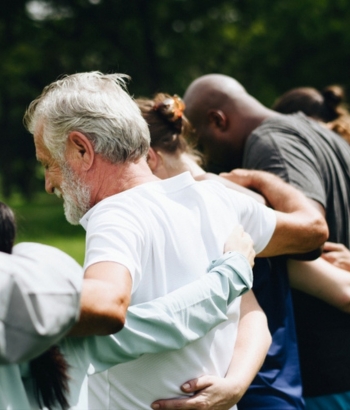
Love Your Enemies, Say No to Contempt
Arthur Brooks sees society as suffering from contempt, “our habit of treating people who disagree with us...as worthless,” and argues instead for a culture of warm-heartedness. Although doing so can be a challenge, Brooks sees the use of warm-heartedness as central to defying the destructiveness of contempt.
Read More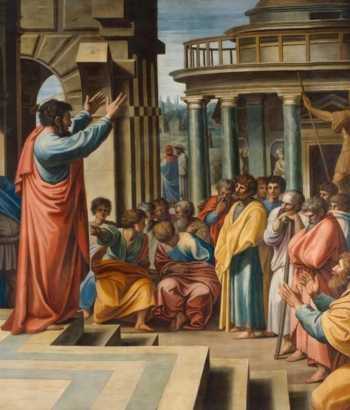
Witness to Unity
Kenneth Himes reflects on what the church might offer to a nation caught up in “sectarianism”—an emerging reality where “mega-identities” absorb the identities and connections people make with others across differences. From Paul’s writings, Himes suggests that the church today can model unity by affirming our “foundational identity of being a member of the body of Christ” that makes room for diversity and difference within a community committed always to one another.
Read More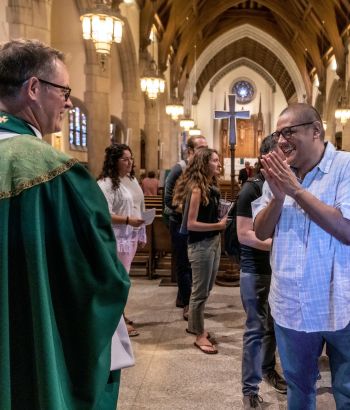
Meeting Polarization with Loving Solidarity
Brian Robinette explores polarization and the obstacles it creates for meaningful communication and connection. Against so much historical and contemporary conflict, Robinette argues that the Christian vocation must be rooted in Jesus’ loving solidarity, through which the church can offer healing pathways “rooted in this source experience of God’s embracing love.”
Read More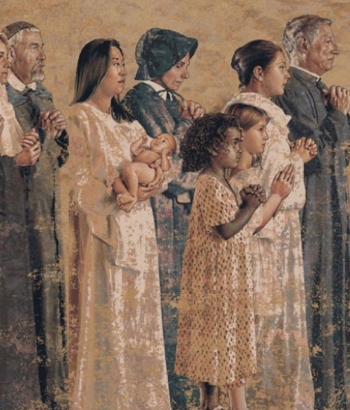
Authentic Communion and the Way Out of Polarization
As Sam Sawyer, S.J., writes, St. Ignatius’ “Presupposition to Charity” offers a hopeful vision for Catholics experiencing polarization. The “Presupposition” challenges Catholics to live out the communion that is central to Catholic life by seeing how even our differences might “proceed from a desire for the good, and a desire for God.”
Read More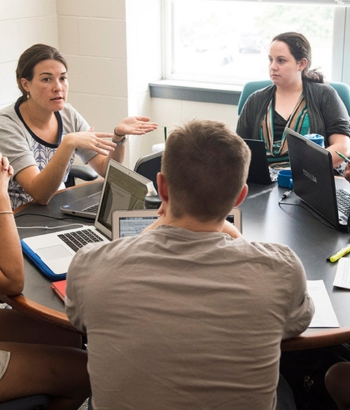
Honoring Ideological Divides
How can Jesuit institutions effectively respond to the profound ideological division that threatens U.S. society today? What does it mean to embrace a Jesuit, Catholic mission in such a way that it can help our campus communities and our nation to navigate the turbulence through which we are living? In early May 2022, three high-profile legal scholars and leaders in Jesuit higher education sat down together to address these questions.
Read More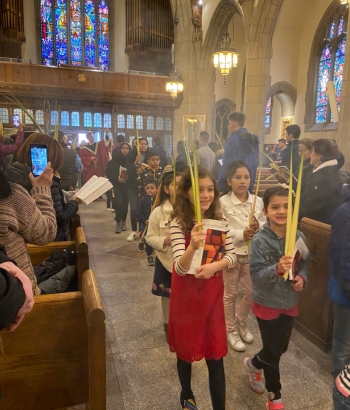
Journeying Together
Richard R. Gaillardetz identifies the importance of synodality for Pope Francis and the Catholic Church. Gaillardetz states that polarization challenges this synodality within the Church and occurs when we identify with a specific group and are “governed less by the pursuit of truth than by ‘confirmation bias.’” He offers the tangible practice of challenging thoughts or policies within our “groups” in order to build more common ground across them.
Read More
Witness to LOVE
If you are looking for a beautiful story on how “God is involved intimately in the details of our lives” and why a couple would choose Catholic marriage, this one will inspire you. Mary-Rose Verret reflects on a couple she met in her ministry, their love, and how God continues to call deeply into the hearts of people through the vocation and Sacrament of Marriage.
Read More
Best Practices in Digital Ministry
Is it possible for ministries to thrive in the digital world? As author John Grosso indicates, “people of all ages are participating in digital faith sharing, and real community is formed in these digital spaces.” This article shares his recommendations and best practices for using digital media to enhance ministry.
Read More
Living Catholicism: A Church In Need of Its People
In this essay from Fr. Michael J. Himes (1947-2022), he reveals his “hope that these words will instill within you a conviction that Catholicism is alive through your life.” Fr. Himes reflects on our role as the Church, God’s love for us as the People of God, and our need to be in community.
Read More
A Wondrous Adventure
Seeking to understand the Mystery of Faith? The Catholic Intellectual Tradition offers the opportunity to discover the “deeply complementary, indeed mutually enriching” aspects of faith and reason. In this lecture excerpt, Fr. Robert Imbelli draws us into celebrating and exploring its “adventure.”
Read More
Dear Future Church
What do young adults hope for when thinking about the Church? The Student Voices Project, which offers tools for capturing student input on faith, is providing critical insights, which have been shared with the Synod on Synodality. Ultimately, Dennis Wieboldt hopes it will inspire the Church’s witness to faith through a balance of social justice, sacraments, prayer, and emphasis on community.
Read More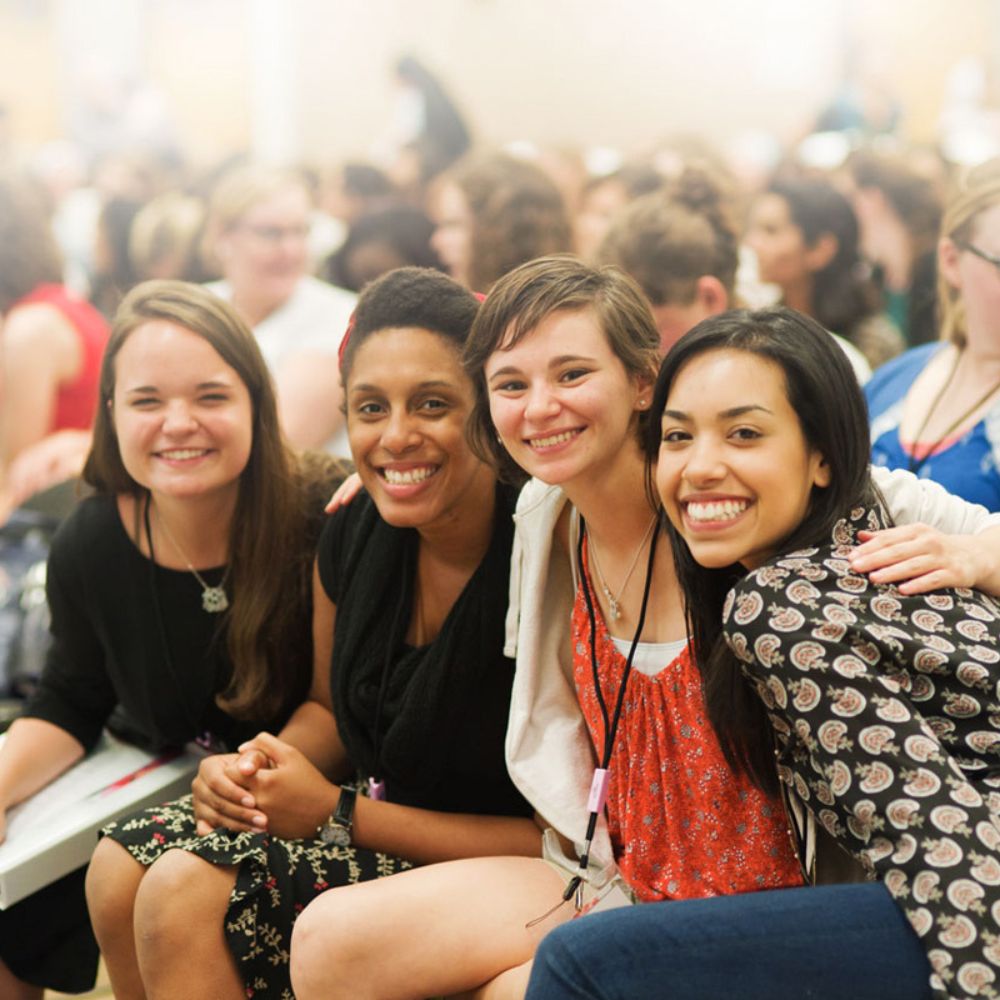
Women in Ministry VOICES
In Carolyn Y. Woo’s recent book Rising - Learning from Women’s Leadership in Catholic Ministries (Orbis Books 2022), she discusses the profound impact of women on the Church, despite the existing challenges. Woo features the powerful stories of sixteen women, including her own and those of the authors quoted here. These brief excerpts from the book offer a glimpse into the profound faith, work, and hope of these individuals.
Read More
Share Your Faith Stories
Professor Thomas Groome describes the importance and power of Christians sharing personal faith stories.
Read More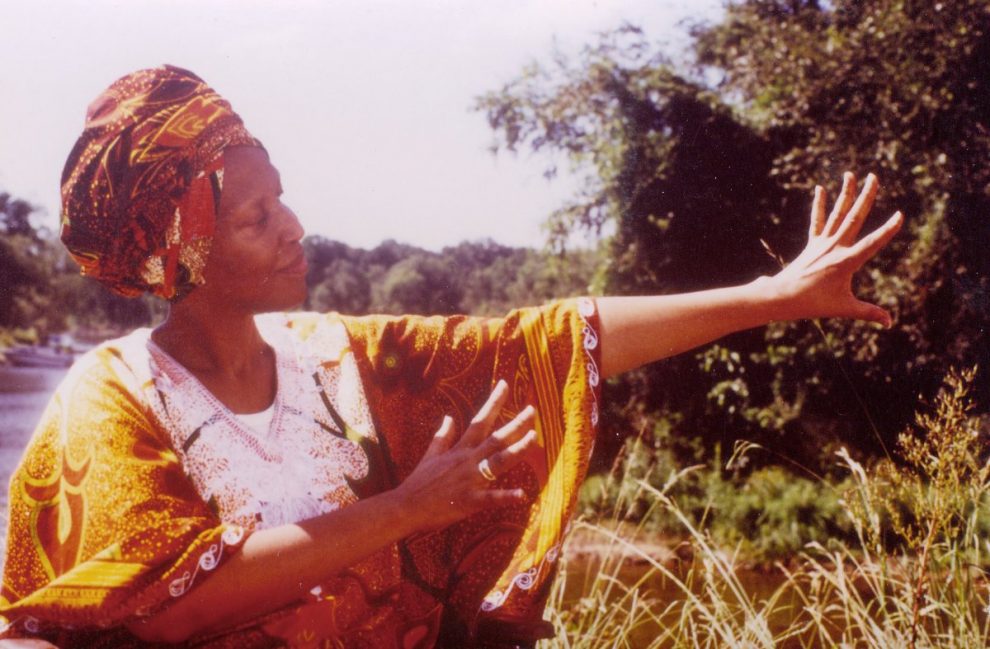
Sister Thea Bowman and Catholic Spirituality
It‘s been nearly 30 years since Sr. Thea Bowman famously declared to a gathering of the U.S. Catholic bishops that her “Black self,” with all the Black songs, dances, and traditions she’d imbibed while growing up in Canton, Mississippi, was a gift to the Church.
Read More
The Face of Our Lady of Guadalupe
Saving face. According to the Oxford English Dictionary, the expression means “retain respect; avoid humiliation.” The words are used metaphorically, yet I recently found myself arguing why we must, literally, save—read: affirm, defend, honor—the indigenous, dark-skinned face (el rostro indígena) of a most treasured icon among Hispanic Catholics: Our Lady of Guadalupe.
Read More
Racism's Sin
In a 2014 essay, that still resonates today, Boston College theologian M. Shawn Copeland considers racism within American society and the U.S. Catholic Church and the emergence of Black theology as part of the fight for human dignity for all people.
Read More
Race in the Catholic Imagination
On September 11, 2017, Bishop George Murry, S.J., of Youngstown, Ohio, spoke at Boston College as a Church in the 21st Century Center Episcopal Visitor.
Read More
How Long, O Lord?
These are names we know, and these are the words of Psalm 13. After the death of yet another Black man they are my words as well. The psalmist is angry, questioning why God has not acted. The stench of sin filled the nostrils of God. God smelled it, tasted it. As of old, it is again today.
Read More
Forum on Racial Justice Highlights BC Initiatives on Racism
Boston College has announced several initiatives, including a Forum on Racial Justice in America, to address issues of race and racism in the United States.
Read More
That We May Be One
My mother is Catholic and white, and my father is Methodist and black. They raised our family in the Catholic Church, but growing up, I never really felt connected to the Church and didn’t have a relationship with Jesus.
Read More
Discerning Justice
When I was about eight years old, I moved to a neighborhood with a high concentration of Japanese people. My mother, being from Japan, finally had somewhat of a community where she could speak her native language and have a felt sense of home.
Read More
The Power of a Parish Priest
In this piece a young man reflects on the life-changing support and steadfast dedication he received from his local parish priest.
Read More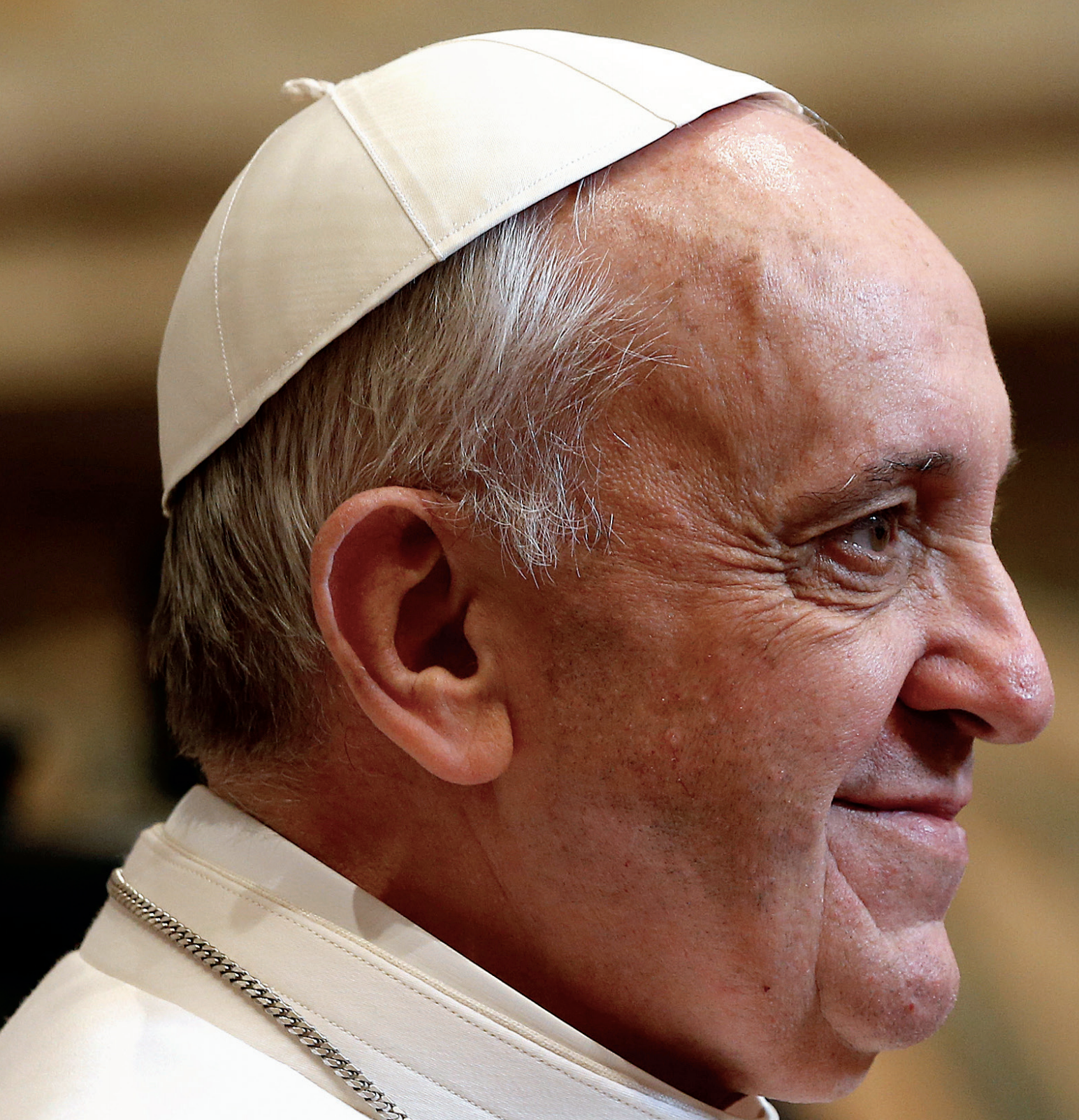
The Story of My Vocation
Pope Francis has often spoken effectively about the importance of Baptism, and on several occasions he has asked the faithful if they can remember the day on which they became a Christian.
Read More
Becoming a Somebody
The story of Guadalupe is also the story of an indigenous man, Juan Diego, who at the beginning tells Guadalupe, “I am a nobody.” He literally uses the term “piece of dung” or excrement.
Read More

The Road Ahead
Boston College students, joined by their philosophy professor Jeffrey Bloechl, walked 215 miles of the Camino de Santiago as part of a class called Self-Knowledge and Discernment: The Experience of Pilgrimage.
Read More
Conscience Wide Awake
Each summer I finalize my course syllabus for the fall. That syllabus serves to outline the objectives of the course, to distribute course materials reasonably so as to get my students somewhere close to those objectives, and, if that syllabus is really good, to create an arc of questions and themes that will draw students in, ignite the questions, and inspire their own pursuit of understanding the world and themselves more deeply.
Read More
Responding Like Jesus
Feeding the Poor—At a Sacrifice Teachings of Dorothy Day and Peter Maurin
Read More
Crafting Conscience in Your Child 10 Things Parents Can Do
While parents are readily recognized as primary in forming the superego, they can also be most effective in forming the conscience of their children. Though abstract moral reasoning is not developmentally possible before the teenage years, yet parents can encourage concrete moral reasoning in children from an early age that can help to form their conscience.
Read More
The Last New Person
Friday afternoon at the hospice center. I punch in and eye the whiteboard, looking for empty white strips and unfamiliar names, quickly piecing together who has died, who is still living in this 18-bed facility.
Read More
Handing on the Catholic Imagination through Story
Religion begins in the imagination and in stories, but it cannot remain there. The stories which are our first contact with religion (“A decree went out from Caesar that the whole world should be enrolled…” “Early on the morning the first day of the week…” “And Jesus took bread and blessed it…”) are subject to rational and critical examination as we grow older to discover both what they mean and whether we are still able to believe them.
Read More
A Gift of Humble Service
The Ignatian Volunteer Corps® (IVC) provides men and women, most age 50 or better, opportunities to serve others and to transform lives. IVC matches the talents of experienced Volunteers with the greatest social needs of our time.
Read More
A CHURCH That is POOR and for the POOR
The Church has realized that the need to heed this plea is itself born of the liberating action of grace within each of us, and thus it is not a question of a mission reserved only to a few…it means working to eliminate the structural causes of poverty and to promote the integral development of the poor, as well as small daily acts of solidarity in meeting the real needs which we encounter.
Read More
Voices
Being a Hispanic/Latino Catholic who speaks English, Spanish, and even Spanglish means living in a world that isn’t only one way or only needs to be only in one language, rather it is living with a faith that can be experienced and understood for all its richness.
Read More
Eucharist: The Many Faceted Jewel
With these beautiful poetic words the great medieval theologian St. Thomas Aquinas summed up the centrality of the Eucharist for us Christians.
Read More
It Starts With Our Seminaries
Many Catholics share a heightened, even unprecedented, level of concern for the well-being of Catholic seminarians.
Read More
The Opportunity Before Us: Giving Women a Place at the Table
The secular feminism of the latter half of the twentieth century made more than a few just demands, especially in light of the global, historical record concerning women’s dignity. But still it could not be reconciled with a wholly Catholic project for women, including the project of conceiving the work of women in the Church.
Read More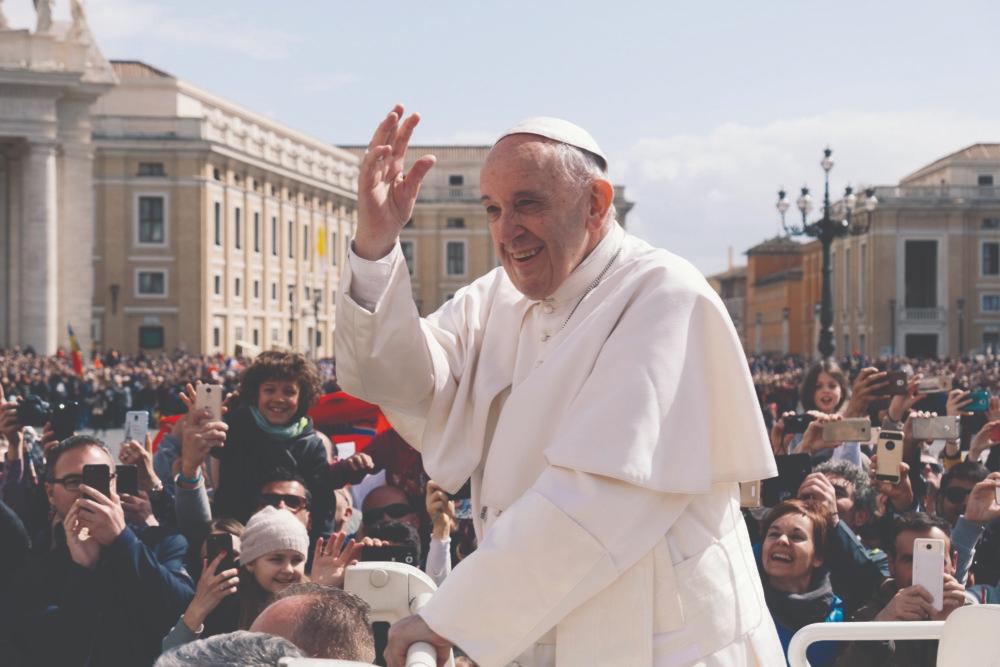
Pope Francis: Selections from “Letter of His Holiness to the People of God”
In the wake of the revelations about then-Cardinal Theodore McCarrick, the release of the Pennsylvania Grand Jury Report, and growing concerns with abuse in the global Church, Pope Francis released a “Letter to the People of God.”
Read More
You are Made Worthy
We live by stories. They shape our daily practices and decisions. But they also communicate something of what we believe makes life valuable, even what make us valuable.
Read More
Young Hispanics Are Revitalizing the Church in the U.S.
One of the driving forces during the process was to discern how the Catholic community in this country could respond more intentionally to the needs and hopes of young Hispanic Catholics, especially the U.S. born generations.
Read More
A Moment for Young People Q&A with Jonathan Lewis
The Catholic Church is no stranger to reform. Throughout its two-thousand-year history, many holy, creative men and women have risen to the occasion and introduced necessary changes for the health and well-being of the Body of Christ.
Read More
On Not Losing Heart: Catherine of Siena and the Strategies of Prayer and Friendship
The Catholic Church is no stranger to reform. Throughout its two-thousand-year history, many holy, creative men and women have risen to the occasion and introduced necessary changes for the health and well-being of the Body of Christ.
Read More
Guided by the Holy Spirit
Theologian Richard Lennan argues that the course forward for the Church must be charted by the cultivation of intentional discernment, memory, and Christian hope. Together they will ensure that the Church is moving according to the direction and under the guidance of the Holy Spirit.
Read More
Stories that Explain and a Message that Transforms
Jesus…told stories. Not just any old stories. These stories were, for the most part, not “illustrations,” preachers’ tricks to decorate an abstract or difficult thought, to sugarcoat the pill of complicated teaching.
Read More
Christ is our Story
The Exodus and the Christ story are the fundamental biblical [quest] stories which shape the Judeo-Christian community’s sense of reality both in expressing what the community is trying to do (be) and what it does (is) without trying.
Read More
Forgive and Let Live
One day during Lent, I was giving a talk at a parish about sin and forgiveness. After the talk, a guy named Seamus came up to me. He was about 80 years old, a first-generation American whose parents had come from Ireland.
Read More
Hail Mary
The first time I met with my spiritual director after entering the Jesuits, he asked me how I pray. One of the things I mentioned was regularly rattling through Hail Marys.
Read More
Wrestling with the In Between
I know that I am just “in that age” and that this is not necessarily uncommon, but it does indicate to me how people my age are seriously interested in getting married. I place myself in this space too; I’d like to be married someday.
Read More
The Challenge of Youth Ministry After the Sexual Abuse Crisis
In my experience working with Boston College students in campus ministry and social justice programs from 2011-2016, few virtues play as central a role in the way in which young people articulate their beliefs, values, and aspirations as that of authenticity.
Read More.jpg)
The Grace of “I Do”
The Grace of “I Do”—Call it the grace of the sacrament if you like, all I know is that we began working harder to voice our resentments and frustrations.
Read More.jpg)
Waiting for Gabriel
Do you have children?” For most 30-somethings, this harmless question is the opening volley of a round of acceptable chit-chat. Colleagues at the office fill silences with news of recent pregnancies, first Communions and athletic milestones in their children’s lives.
Read More.jpg)
Welcoming All to the Table
Scripture scholars now highlight that one of the most integral aspects of Jesus’ public ministry was that he welcomed all to the table. Indeed, one of the first charges made against Jesus was that he ate “with tax collectors and sinners” (Mark 2:16). Sharing a meal together in Jesus’ culture held a unique weight; it reflected respect, acceptance, and full inclusion. Jesus intended his disciples to promote a community that welcomes and honors all.
Read More
The Heart of the Tradition
The Catholic Intellectual Tradition is the two millennia effort to ponder the meaning and implications of that new reality and to investigate its relation to other facets of human experience. It addresses the new questions that arise from humanity’s ongoing discoveries in the realm of science and the ever more pressing encounter with the other great religious traditions. The Catholic Intellectual Tradition is the joyful celebration and the continuing exploration of what Saint Augustine called the “beauty that is ever ancient, ever new.”
Read More.jpg)
The Beauty of Being…With the Poor
“Ten times a day something happens to me like this – some strengthening throb of amazement – some good sweet empathic ping and swell. This is the first, the wildest and the wisest thing I know: that the soul exists and is built entirely out of attentiveness” – Mary Oliver
Read More.jpg)
Everyday Grace: Guardian Angels at Work
During those early summer mornings, my grandfather and I also explored questions about God, Jesus, and miracles. He told me that everyone has a guardian angel to help them see God’s work in their daily lives. At 10, I searched everywhere but could not see mine or understand. I adored Puppy, and we shared a world filled with laughter, stories, hugs, and smiles. Puppy’s subsequent death the next morning in his own bed a little over 100 miles away shook my very foundation and core beliefs.
Read More.jpg)
Tattoos on the Heart: The Power of Boundless Compassion
Inching ourselves closer to creating a community of kinship such that God might recognize it. Soon we imagine, with God, this circle of compassion. Then we imagine no one standing outside of that circle, moving ourselves closer to the margins so that the margins themselves will be erased. We stand there with those whose dignity has been denied. We locate ourselves with the poor and the powerless and the voiceless. At the edges, we join the easily despised and the readily left out. We stand with the demonized so that the demonizing will stop. We situate ourselves right next to the disposable so that the day will come when we stop throwing people away.
Read More.jpg)
Intimacy, It’s Complicated
How I started giving talks about hookup culture, dating and relationships is still a bit of a mystery to me, but one thing I know for sure is that about ten years ago I and many others at the university at which I work started to sense a genuine loneliness among our otherwise bright, involved, connected and accomplished students.
Read More.jpg)
The Intimate Journey of Relationship with God
Every relationship begins somewhere. Some begin romantically with our hearts alive in the excitement of getting to know someone who we are drawn to for the very first time. Some begin at our birth with our introduction to our family. Some begin at school or work, where we first meet our peers and colleagues. Some begin at our baptism, when the immersion into water symbolizing both our dying and rising with Christ signifies our inherent immersion into a set of relationships (the entire Body of Christ, which is the church) that can never be undone. Yet, there is one relationship that begins before all others.
Read More.jpg)
All in the Family
It takes a village to raise a child. This proverb gained pressing relevance for me when my husband and I embarked on our journey of parenthood. Even though my husband was as involved with the care of our infant daughter as I was, it quickly became clear that we were not up to this adventure alone—at least not with our sanity intact. We needed help. We needed a village.
Read More.jpg)
Bob Cousy: Of Years of Love, and a Long Goodbye
Bob Cousy knows a bit about game plans, and he and his wife, Missie, were always a team. In the early days of their marriage, when the Celtics star was gone for weeks at a time, Missie made her husband a presence in the family home by telling her daughters where he was and what he was doing.
Read More.jpg)
Education for Living Faith
In our respective roles in Alumni Relations and University Communications, we are fortunate to have the opportunity to interact regularly with BC alumni and students whose selfless acts, kind gestures, and indomitable spirits have inspired us with their capacity to love, care for, and serve others.
Read More.jpg)
A Mother and the Eucharist
There I was, standing there with all my flaws, holding the most perfect gift ever and about to receive His most perfect gift, the Eucharist. The communion of those gifts was magnificent.
Read More.jpg)
The Antidote is Love
Scripture advises us that we should turn the other cheek to violence. However, my Jesuit training has taught me that in addition to nonviolent resistance we should hit back with love
Read More.jpg)
To Work Is to Pray
I took a leadership position at a progressive company that’s committed to refugees, America’s working class, and changing the food industry in our country.
Read More.jpg)
Deep and Abiding Friendship Lasts Forever
When I reflect on these old friends, I can say both that I miss them, but also that I do not miss them—because I continue to experience their presence in my life: their goodness, their humanity, their humor, their faith, the joy and fulfillment that was mine through knowing them.
Read More.jpg)
Being Worthy of Friendship
Aristotle defined three types of friendship, but said the perfect form is “friendship of the good,” in which people recognize each other’s goodness and help each other to be good.
Read More.jpg)
My Yaya: My Grandma, My Friend
The more time I spend with Yaya, the more grateful I become not for the adventures I cherished most as a child—trips to the beach, the amusement park, or our beloved local ice cream shop—but simply the gift of time, the gift of being with her.
Read More.jpg)
Coming Home
“Nothing is more practical than finding God, than falling in Love in a quite absolute, final way…”
Read More.jpg)
Think Critically, Act Lovingly
“Christians ought to be like giraffes. They should have tall necks, so that they might have a global vision of the world, its challenges, and its sufferings.”
Read More
Catechesis among Young Hispanic and Latino Catholics
The most significant question for most Hispanic families concerns whether these ministries are offered only in English or in both English and Spanish. My experience of 30 years in ministry at various levels of the Church shows that parishes that offer catechesis in both English and Spanish reach a larger segment of the Hispanic/Latino population.
Read More
American and Catholic in an Increasingly Hispanic Church
A breath of fresh air and renewed energy is profoundly transforming the entire U.S. Catholic experience from the ground up in many ways, thanks to the fast-growing Hispanic presence.
Read More
Undocumented Witness
Between Saturdays, she does laundry and cleaning for a wealthy family whose head of household is a university administrator. She has been helping to raise their daughters since the youngest was but an infant. Maria left behind her own infant daughter in the care of her parents and sisters two decades ago.
Read More
A Plea to Pastors and Bishops
The reality of immigration and the growing population of peoples of Latin American descent is a challenge and a hope for the Catholic Church in the United States. It is a challenge because it is the living circumstance that calls us to put into practice the evangelizing dynamic that Pope Francis calls for in Evangelii Gaudium. It is a great hope because rising to this task offers us a pathway to a renewed witness to the presence of Christ in the Church.
Read More
10 Things to Know About Hispanic Catholics
Hispanics were the first Roman Catholics in what is now the United States. Spanish-speaking Catholics have lived in what is now the United States for twice as long as the nation has existed.
Read More
A Promise to a Friend
Jack Dunn, associate vice president of the Office of University Communications at Boston College, shared the story of a promise he made to his best friend, Nick, who was dying of amyotrophic lateral sclerosis (ALS), Lou Gehrig's disease. Here's an excerpt from the Agape Latte talk.
Read More
The Priceless Gift of the Priesthood
I am a Jesuit priest because of the grace of God, not because I have earned or merited such a vocation. When I review my life, I see evidence of grace and freedom, freedom as defined by the Jesuit theologian Karl Rahner: “the power to decide about oneself and to actualize oneself.”
Read More
Walking with Refugees
The Jesuit Refugee Service (JRS) "seeks to accompany, serve, and advocate the cause of forcibly displaced people, that they may heal, learn, and determine their own future." Since 1980, JRS has served in communities across the globe, providing "education towards livelihoods."
Read More